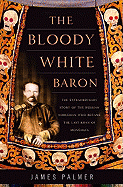

How could a previously unpromising Estonian cavalry officer become the legendary Bloody White Baron, ruler of Mongolia? A romantic view would say it was a case of desire meeting destiny: yes, Ungern wanted to rule a country and was drawn to Mongolia as a land of great conquerors; and, yes, Mongolian folklore foretold that a savior from the north would arrive on horseback to rescue them from crisis. But Palmer knows the 1915-1921 period and deftly integrates Russian, Japanese and Chinese history and politics (along with the prevailing chaos following World War I) to frame the astonishing story as a mesmerizing geopolitical essay in power, timing and force of will.
"Mongolia and Manchuria had been the fault line for conflict between the old and crumbling tsarist and Chinese empires, but also the focus of the new imperialism of Soviets and Japanese," Palmer writes about the territory into which Ungern galloped on his white charger. Under his fierce and fearless leadership in late 1920, his troops invaded Mongolia and restored the king to power. To grateful Mongolians, he symbolized anti-Chinese resistance and they dubbed him the God of War.
By February 1921, Ungern was declared a reincarnation of the Fifth Bogd Gegen, was made a khan and was granted a hereditary double princedom and the title of Outstanding Prosperous-State Hero. All of this fit neatly with his personality and fantasies: he loved ritual, order and honoring ancient traditions; the power also gave him free rein to kill and maim.
Ungern's control in Mongolia did not go unnoticed by the Soviets and he was eventually captured and imprisoned. His trial of September 15, 1921, led, in the Bolshevik tradition, to a speedy execution. In Palmer's astute summary: "The Mongolians were the tools, and the victims, of a delusional psychopath driven by a fusion of religious, imperial and reactionary ideology." Yet Palmer met a woman whose family still regards Ungern as a god and liberator; her family no doubt compares him to the Soviets who visited even greater violence and destruction on Mongolia, turning its early 20th century history into one devastation after another.--John McFarland
Shelf Talker: The Bloody White Baron recounts a little-known tale of post-World War I geopolitical maneuvering (and horrors) with passion and verve.

